So for those of you don’t know, I have a 3-year-old daughter (her name is Harper). Here is her hand:
When she was an even littler girl then she is now, she got pink eye. Bekah and I spent a bunch of time googling and calling around doctors offices and urgent cares trying to find out where you take a tiny kid, with pink eye, at 5 pm on a weekday. After spending a few minutes searching around, in total dad mode, I said fuck it and just took her to the ER at Hoag hospital. First kid, first time I didn’t know what to do -> first ER visit. But I will never forget struggling trying to figure out what I should do via the internet. And I’m pretty good at the Google.
So imagine how many scared people, parents or otherwise, turn to a Google search to get quick, accurate information so that they can make informed choices about their medical care. Sadly, all those people are misplacing their trust, just like I was.
Your Money or Your Life
As many of know, Google has quality rater guidelines for the people who go through and manually rate websites. These guidelines, which you can find here, have a callout section for “Your Money or Your Life” search queries. Here is what they say about pages that target users money or life:
Apparently, the type of pages that require a “very high Page Quality” don’t include Google My Business profile pages, because the profile pages and local pack results for emergency medical services (EMS) are often a dumpster fire.
If you are going to provide users with local businesses for EMS searches, then you have to be on it 99.9% of the time. IMHO, some of the results I’m going to show you are the most ethically and morally negligent thing to come out of Google in a while. And I say this as a Jew who doesn’t think holocaust denier sites should rank #1 for “Did the Holocaust happen?” and related queries.
Alright, enough of the soapbox, on to the evidence.
Exhibit 1: ‘Pediatric Hospital’
A few weeks ago this was the local pack result for the search term ‘pediatric hospital’ when searching from my house:
This is the vaunted jOE’s pediatric hospital
Yes, you see this correctly.
The #1 search result in a local pack for “pediatric hospital” is a spam listing for an out-of-home doctor’s office.
But it’s even worse, as the second result isn’t any better. Dr. Timothy K. Flannery, MD is probably a fantastic pediatrician, with rights at a pediatric hospital; however, that result is entirely useless for someone looking for the nearest pediatric hospital.
And Nexus Children’s Hospital, despite having ‘hospital’ in the name, is a small practice that doesn’t provide emergency medical services.
This SERPs is a complete strikeout in terms of providing relevant search results for something more precious to a lot of people than their own lives, their kid’s life.
Now, on to the chaser. I live in Orange County, CA. We have an award-winning pediatric hospital (Children’s Hospital of Orange County aka CHOC). Where do you think CHOC ranks here?
If you guessed in the #4 spot just outside the pack, well, get yourself a cookie, on me:
And check out those distances. Google displayed further, less relevant search results, then the top tier pediatric hospital less than 8 miles away from me.
Let’s not even get into the fact that Hoag (my local hospital) isn’t even in the results at all.
That would have been a much more relevant result then any of the 3 Google decided to surface. Big shout out to The Hawk aka Joy Hawkins for helping me get jOE’s hospital removed so an actual pediatric hospital can be 1/3 of the results.
Exhibit 2: “Children’s Hospital”
Here is what I get for ‘childrens hospital’
Hey, at least CHOC is the first two results, right? Wrong! The first result is excellent, the main campus of a renowned children’s hospital should rank #1 for “childrens hospital.” The second result is a clinic that doesn’t provide emergency medical services, so not a good search result.
The third result again underscores the problem with an algorithmic ranking of EMS providers. It’s the St. Jude’s fundraising office. It shows up in the search result instead of an actual medical provider. This is likely because it is attached to a relevant entity for ‘children’s hospital’ and is slightly closer to me, regardless that it provides 0 medical services (emergency or otherwise).
Oh, also it’s categorized as a Children’s Hospital despite not providing medical services at the facility:
Add medical providers to the list of businesses that don’t have to follow Google’s Guidelines for Representing your Business
It sucks that I couldn’t get emergency medical services for my daughter, but hey, at least I could choose a locksmith with confidence, amirite?
Exhibit 3: “Hospital Near Me”
Here are the results for “hospital near me”
Literally, none of these are hospitals.
This is the Samueli Center for Integrative Medicine:

I’m sure it’s a good holistic doctors office, but it’s a terrible search result for “hospital near me.”
In fact, the nearest full-service hospitals to me (Hoag & South Coast Global) are both under 5 miles away and are sitting pretty at #5 & #7 in the local finder:
The third closest hospital to me is 4.5 miles away and not even in the finder top 8.
But what’s really important is that Google could monetize this SERP by selling ad space to an urgent care up top. Because priorities.
Again, this one has a chaser. Of those eight results in the local finder, 3 of them are fake/spam listings:
Long Beach, Memorial Ca
So let’s recap. When I search “hospital near me”:
- There are no EMS providers/hospitals in the pack
- The closest hospitals are ranking #5 & #7 in the local finder
- There are three fake listings in the top 8 results in the local finder
- There is an add for an urgent care at the top of the local finder
It’s pretty obvious the opioid epidemic has hit both the humans and algorithms in charge of these SERPs.
Exhibit 4: “Hospital”
So look, the search query “hospital” in my area is just as borked as all the other queries I have shown you. The nearest and second nearest full-service hospitals don’t show in local search results. Rather than dumping more of the same on you, I wanted to branch out and show how this query is performing in a different geographic area.
This one is a doozy.
My brother-in-law is a swank, sexy murse who diligently provides medical services to the residents of Flagstaff, Arizona at Flagstaff Medical Center (a full-service hospital). I asked him to do a search for ‘hospital’ while at work and send me the results. They are totally craptastic:
The children’s department ranked #1 for the generic query of “hospital” while in the actual main hospital itself is nowhere to be found. On top of that, the second result is a rehab center, and the 3rd result is totally equipped to help with all those x-ray’s & MRIs and CAT scans…
Too bad none of them can provide emergency medical services.
My BIL’s takeaway is pretty on point:
Seriously, never thought of it but that’s a social safety issue imho
You know who nails this search? Yelp! And Flagstaff isn’t even a major metropolitan area. It’s a sleepy mountain town with a public university.
Yelp also has a better result for ‘hospital’ when searching in Cosa Mesa as well. Two actual hospitals (though they aren’t in proximity order, Hoag is about half a mile closer).
So, at least when it comes to EMS search queries, Yelp has Google beat in both major, and minor-outlaying, metros.
WTF, MATE?!?!
Google has a responsibility to fix this.
They have employees who know that these search results are bad, and they also have employees that understand that people rely on these search results. They are actively monetizing them, despite them being objectively horrid search results. All while claiming that they have special scrutiny regarding peoples money & lives.
They can do better than this.
The problem is there is no real meaningful financial incentive for them to fix this problem. There isn’t a lot of ad revenue to be had unless they radically change their local product around. That single paid position on top of the local finder (and a smattering of pack ads and local service ads) aren’t even a drop in the bucket for their yearly earnings. They would have to radically change their local SERPs to increase their ability to monetize.
On top of that, a lot of the problems I surface are a direct outcropping of using programmatic methods to solve potentially life and death search queries. All of the work Google is doing to make the internet “safer” revolves around HTTPs and the migration to a secure web. They are pure homo economicus, they are operating where solving a potential social problem can make them huge windfalls of cash (or protect their dominant market share around paid internet ads and search). There are no windfalls to be had here, just scared people turning to search results looking for information about emergency medical services.
There are potentially two ways they can effectively deal with this:
First, they could disclaim their EMS local search results (and frankly all emergency medical search results) by telling people:
If you think you have a medical emergency stop searching and call 911
Their emergency medical search results are not referrals to EMS services.
If they can put up a message about insecure webforms, or not let you access sites with invalid HTTPs certificates, then they can certainly prevent you from visiting not-a-hospital by telling you that these results are not to be trusted (rather then that they get special scrunity.)
Second, is making hospital and related categories a “protected” category where there is manual verification required. This is relatively similar to the advanced verification process but would deal predominately with existing businesses. I think this would be pretty effective as a lot of the problems with the results I’m pointing out could be dealt with by making sure businesses are properly categorized (and deprioritizing the importance of hospital in the business name). The only problem is this is a manual solution, which Google doesn’t really like adopting.
Whatever they do, they need to figure it out. It’s been going on for far too long.
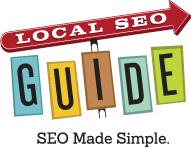
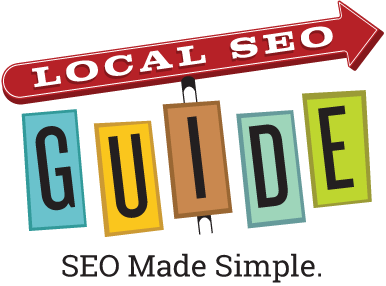

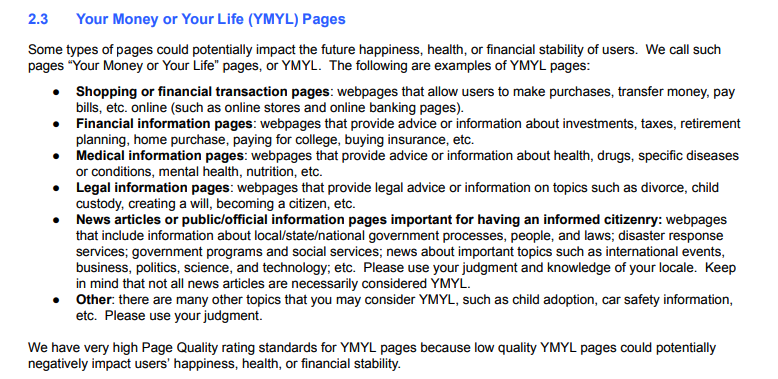
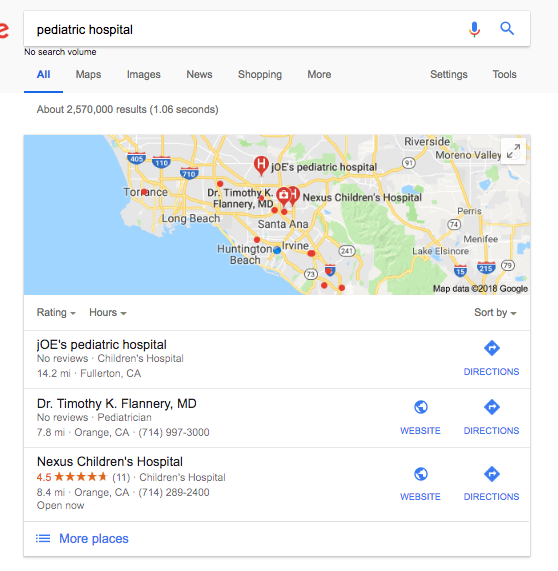
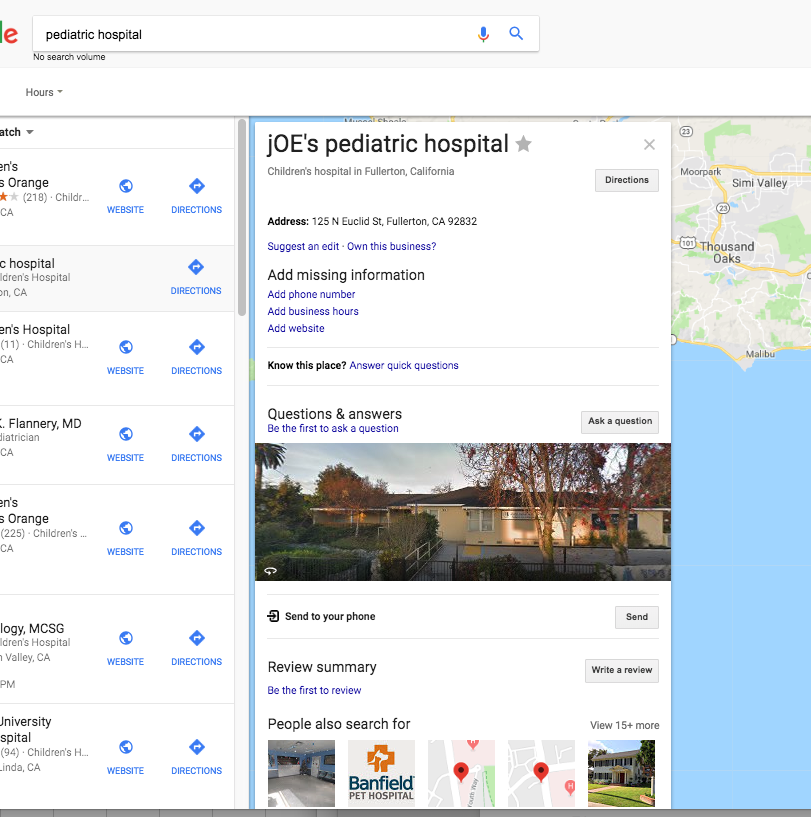
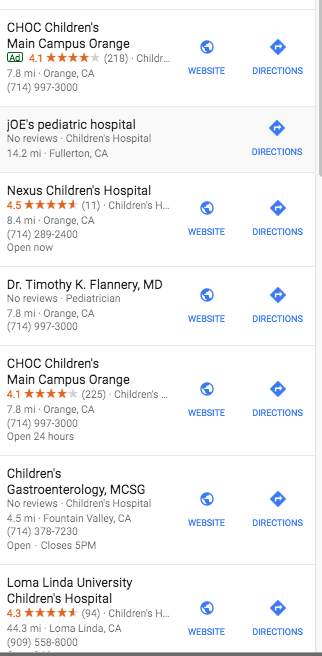
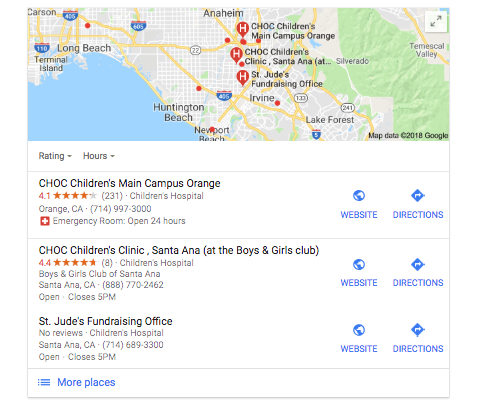
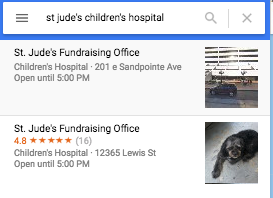

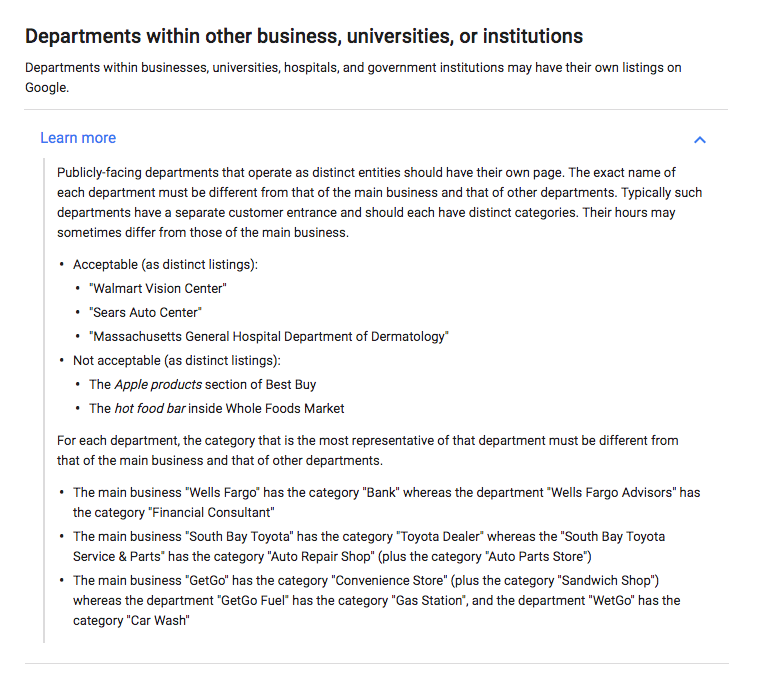
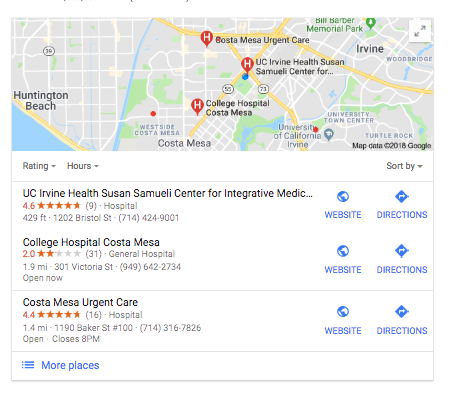
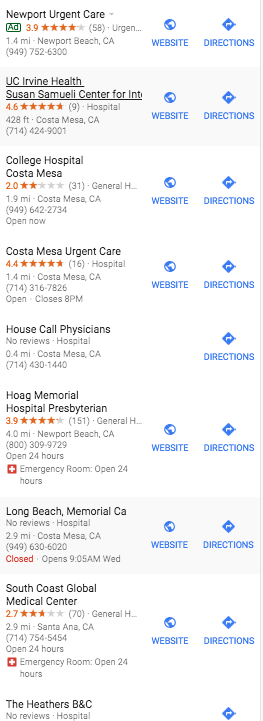
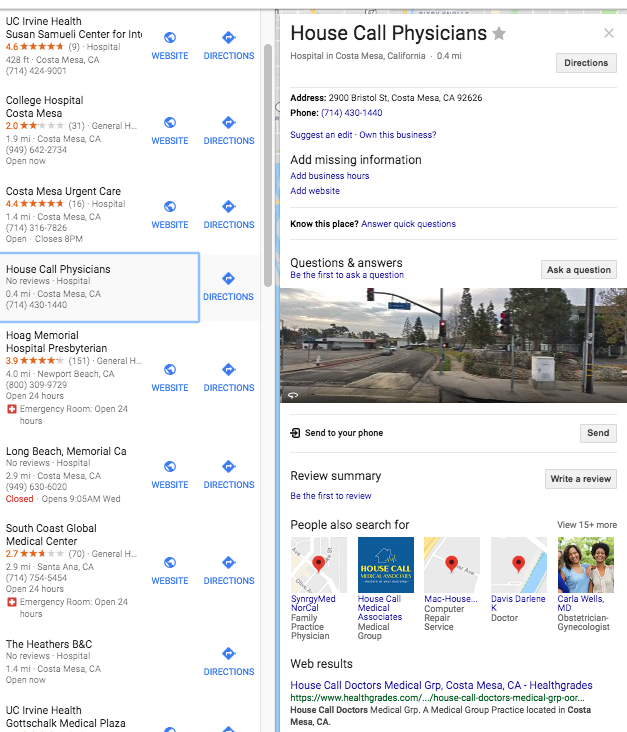

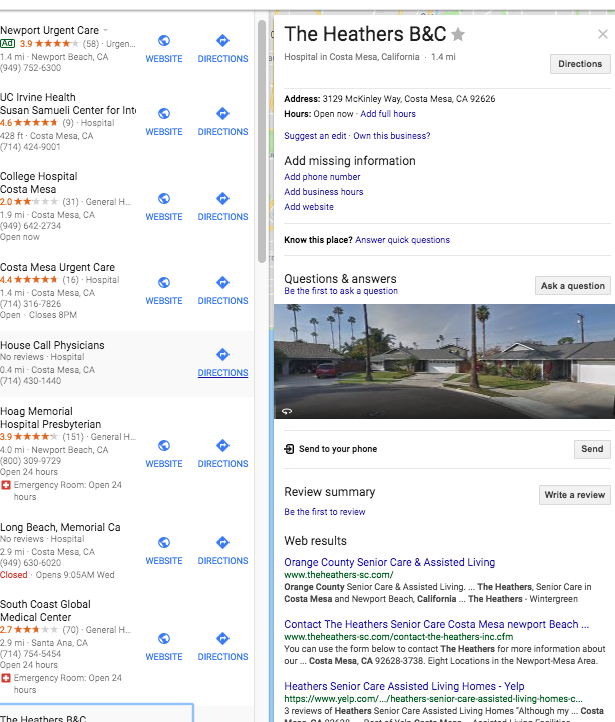
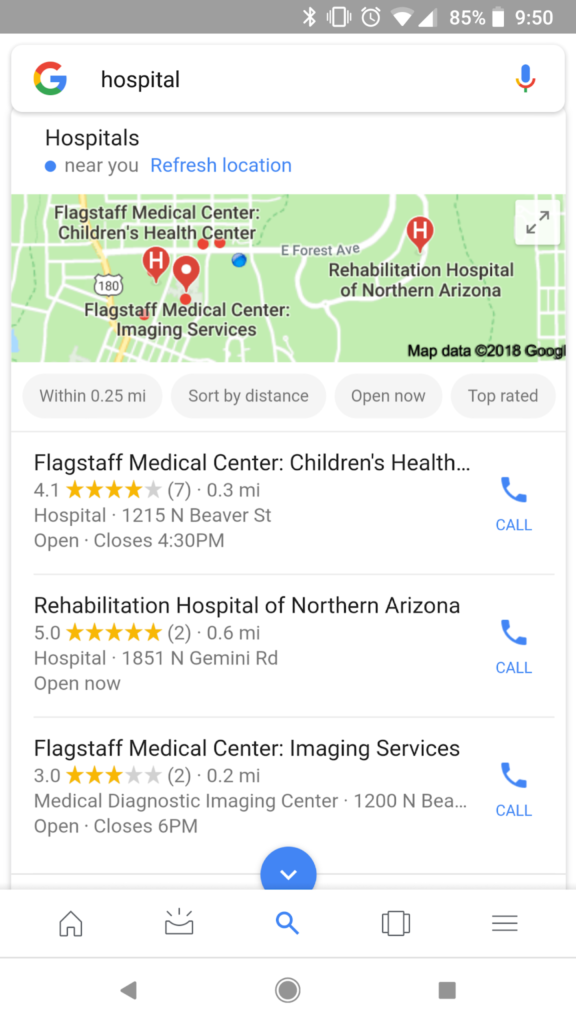
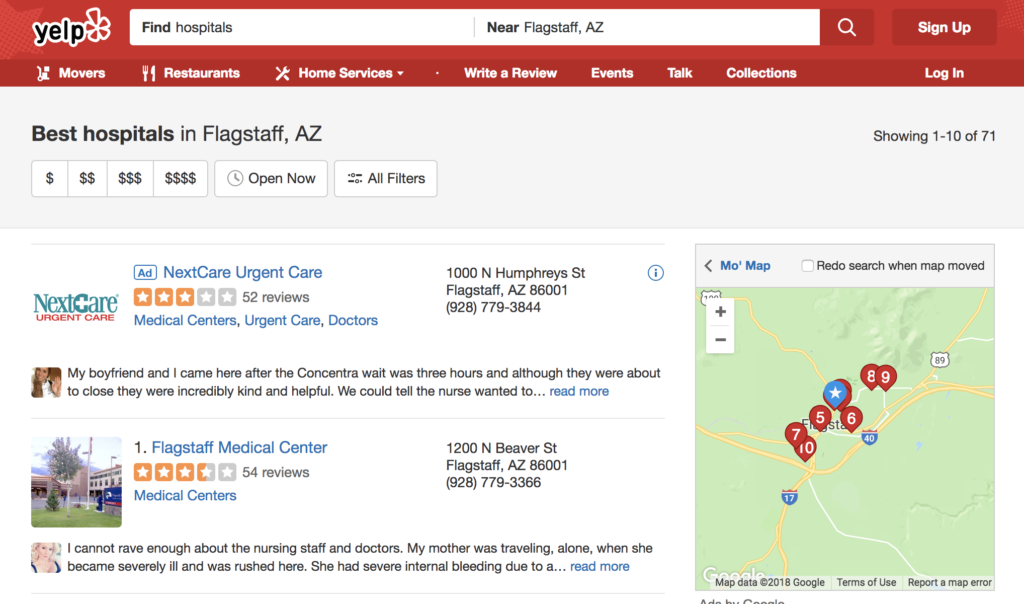
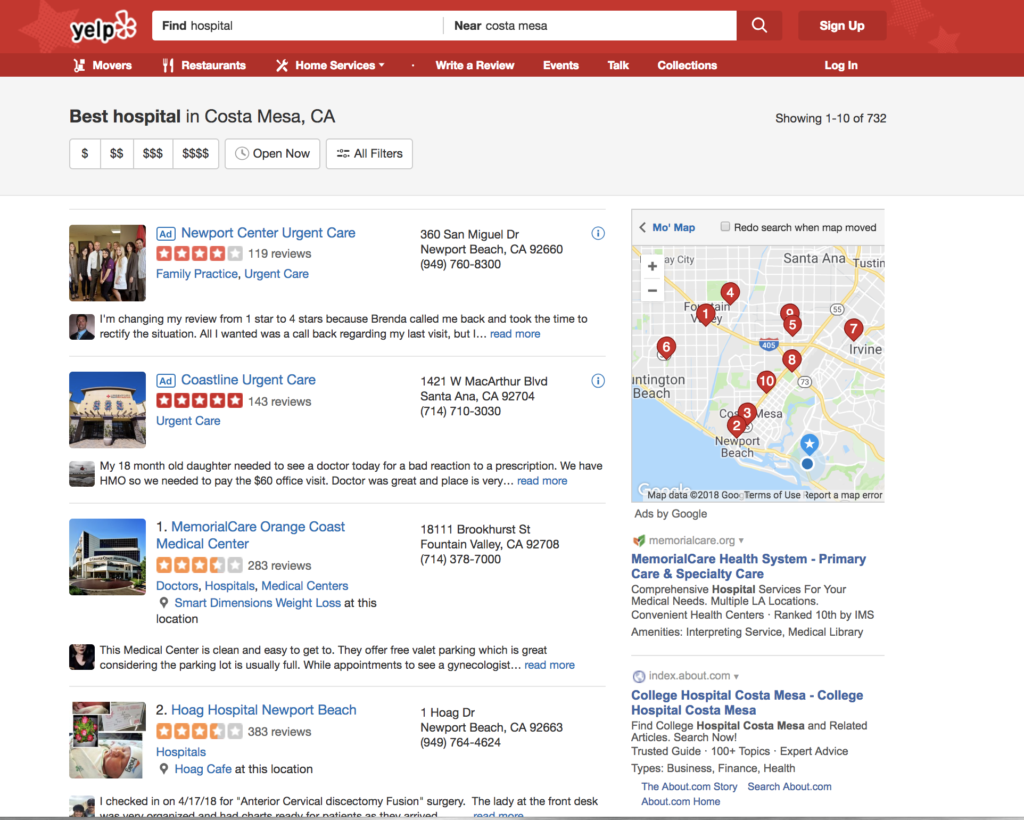
6 Response Comments
Thanks for this post, Dan! I noticed this same thing when searching for “emergency rooms” a few months ago.
Most of the results were garbage which is really unfortunate because when you voice search “navigate to an emergency room near me” you really should be able to trust that.
Google absolutely DOES have a responsibility to fix this.
While I agree with your overall assessment, example 1 does not appear to “spam listing for someone’s house”. Searching the address 125 Euclid st Fullerton Ca, does show a house, but is in a commercial area and displays signs for a Dr Joe and a Joyce Chong MD. Perhaps more a clinic than a hospital, but not a “spam listing for someone’s house”.
You’re right John, it’s even worse as it’s an actual doctor manipulating Google ranking to rank for ‘pediatric hospital’. Either way its spam, and they should feel bad for doing it. I’ll update my post to clarify the specific type of spammer they are.
I’m curious why you think it is a problem that an urgent care clinic has bought an ad that is triggered by a search for a hospital. Are you aware of the issues caused by the huge number of emergency room visits for non-urgent conditions (https://www.ncbi.nlm.nih.gov/pmc/articles/PMC3412873/)? I admit I am biased, as I work with dozens of urgent care practices (including the one referenced in your article), but I believe that we are providing a valuable service by educating the market to help them know when urgent care is actually the best option.
In general, I do agree that many of the issues you point out do need to be addressed. Google certainly could take steps to help. That said, many healthcare organizations do nothing to verify or manage their business listings. I’m not sure that adding additional steps will solve that problem, yet with relatively modest efforts to manage their online presence they could push most spammy results out of the top results.
Hey Ira,
You are misconstruing my comment, so happy to clarify. The problem with the urgent care ad is that Google is making money off the SERP despite the fact that it’s a terrible SERP and potentially dangerous. Their focus is on monetization of SERPs like this, and at least from what I can see (and demonstrate), instead of fixing them. Just like my personal experience in the intro, I would have preferred to go to an urgent care that handles children. Google is getting in the way of that happening too.
Wow Dan, A. A real eye opener and B. Brilliantly researched! As a parent of an 18 month bouncing little girl who is always catching the latest bug at nursery, this is one to keep firmly in mind. So far we’ve not needed to call on searches like this as have always either gone straight to the local doctor or the ER. But you’re right to highlight just how serious this could be and show simple solutions Google could and should deploy.
Thanks
Alistair